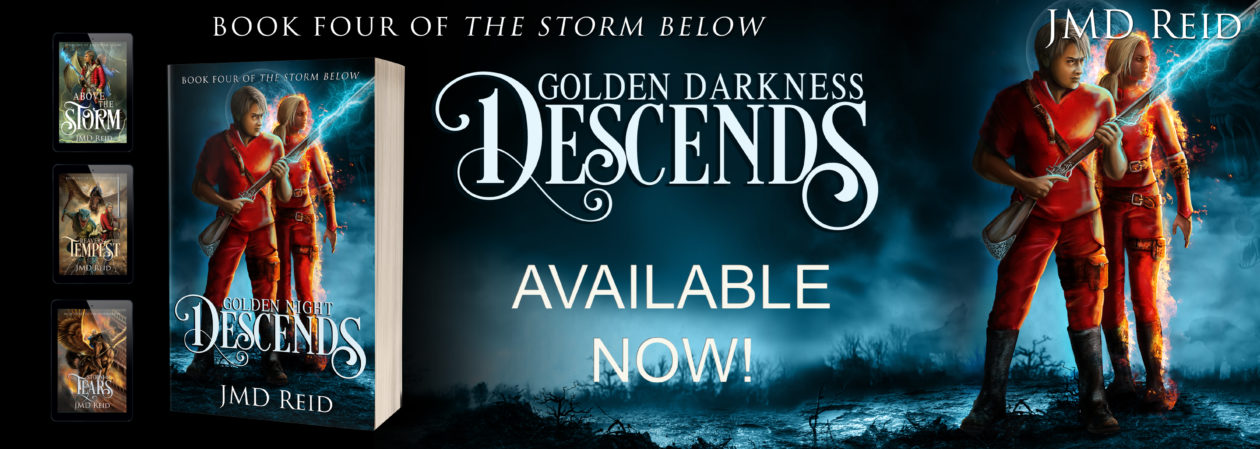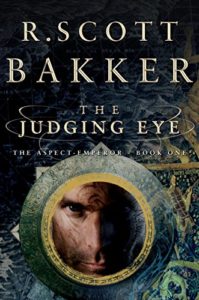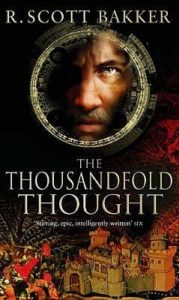Reread of The Aspect-Emperor Series
Book 1: The Judging Eye
by R. Scott Bakker
Chapter Twelve
The Andiamine Heights
Welcome to Chapter Twelve of my reread. Click here if you missed Chapter Eleven!
Little snake, what poison in your bite!
Little snake, what fear you should strike!
But they don’t know, little snake—oh no!
They can’t see the tiny places you go…
—ZEÜMI NURSERY SONG
My Thoughts
This seems pretty clearly speaking about Kelmomas. The nursery rhyme is being dismissive of the little snake. What poison is in your bite? What fear should you strike? But this snake can go places you can’t suspect, just like Kelmomas. He moves through the palace with impunity. He slithers around and, though he’s a child and shouldn’t be feared by adults, he is killing those who stand between himself and his mother.
Early Spring, 19 New Imperial Year (4132 Year-of-the-Tusk), Momemn
Kelmomas knows instantly that his father has returned by how people are acting. It’s a lot of subtle clues, from the Guards’ increased alertness to Apparati running around breathless. He didn’t make the connection consciously until he learned the Yatwerian Matriarch had pissed herself.
He’s come to console Mother, the secret voice said.
Kelmomas reacts badly to this. He works on his model of Momemn while wanting to deny this reality that Kellhus was here. He’s always reluctant to think about him. To plot against him. Not fear. But he finally has to face reality and heads to his mother’s apartments. He hears Inrilatas “ranting about the Gods,” his voice broken from years of shouting. He never stopped raving. He has to pass Inrilatas’s door to reach his mother’s rooms. He reaches the door and slows his breath to hear Kellhus telling Esmenet to keep Theliopa at her side. Esmenet asks if he fears skin-spies.
Their voices possessed the weary burnish of a long and impassioned conversation. But the roots of his father’s exhaustion stopped short of the deeper intonations that warbled in and out of his discourse. A heart teasing hum, and a kind of ursine growl, far too low to be consciously heard by Mother. These spoke from something as unwinded as it was inscrutable, an occluded soul, entirely hidden from lesser ears.
He manages her, the voice said. He sees through her face the way you do, only with far more clarity, and he shapes his voice accordingly.
How do you know? Kelmomas asked angrily, stung by the thought that anyone, even Farther, could see further than him. Further into her.
Kellhus says the Consult will grow increasingly desperate as the Great Ordeal marches nearer. They will use everything they have so Theliopa should stay with Esmenet all the time because only she and Maithanet can see the skin-spies. Kelmomas loves stories of skin-spies and their “wicked depredations.” He loved seeing that one getting flayed alive, though he was careful not to let Mother know that. Kelmomas knows he can see skin-spies, too, but he’ll keep it a secret. Hoping to find one and spy on it. “What a game it would make!”
He wondered who was faster…
Mother is horrified that the Consult will attack the Andiamine Heights. Kellhus says it makes sense to distract him. “But nothing distracts you,” complains Esmenet. In this moment, Kelmomas realizes his mother knows what Kellhus is. As Kellhus says he’s leaving, Kelmomas hears the pain in his mother’s voice. He’s about to burst in to comfort her but his secret voice stops him, saying he’ll be recognized by Kellhus. The voice can’t be sure how much Kellhus sees, but Kelmomas needs to be with his mother, wanting to be hugged and kissed by her.
He’s the root, the voice replied, and you’re but the branch. Remember, the Strength burns brightest in him.
For reasons Kelmomas was entirely unable to fathom, that dropped his hand like lead.
The Strength.
Kelmomas runs. But not in flight. He has a plan. He steals a silver skewer while matronly slaves ruffle his hair and give condolences for his dead brother. He plays with them before running off. He can’t get into the Imperial Audience Hall. Luckily, a balcony door is open and he climbs up to it. From here, he can look down at his mother’s seat. This unnerves him. It’s a reminder that no matter how powerful you are, someone can be higher.
He slides down a tapestry and then mounts the Mantle, the seat of his father’s power. He wants the sparrows to come. He waits a while until one gets caught in the net. He doesn’t have a stone, though, but all he has is a skewer.
The world he walked was far different from the world walked by others. He did not need the voice to tell him that. He could hear more, see more, know more—everything more than everybody save his father and maybe his uncle. His sense of smell, in particular.
He smells his mother’s scent and his uncle. It’s the Matriarch’s piss that attracts his attention. He breathes it in. It excites him in a primal way. He then darts to the balcony behind the thrones. The moon’s out over the Meneanor Sea. The dark sea is ominous. It’s too vast and trackless to be known, even for Kellhus.
Ever did Men drown in blackness, even in sun-spliced waters.
He jumps off and avoids the sorcerous Wards with ease since he’s one of the few. He dodges the Pillarian Guard without any effort. The problem is the Eothic Guard. They have a lot of bowmen and they’re very good at hitting things. Saubon sponsors archery contests to find new recruits for the guard. Only the Agmundrmen from Galeoth are better. So Kelmomas is risking getting feathered. Though the risk sounds fun, he doesn’t actually want to hit.
It was no easy task, culling risks from possibilities.
He skulks across the roofs, using every trick he can to keep from being seen. He fights against a savage grin. He revels in the fun of creeping past Guardsmen without making a sound. He eluded them, enjoying being behind them in the dark and unseen. One nearly spotted him, but he keeps his body motionless. Once he was past, the thrill of almost getting caught rushes through him. He wants to cry out in glee. The rest of the guards “stared out in utter ignorance of their ignorance.” It felt like he existed in a different world from them. He could do anything. Then he feels like he’s testing them. “What if he were a skin-spy?” They fail to spot him, and that angers him and decides on what they should learn. “The darkness, he wanted to tell them, was not empty.”
He soon reaches the guest apartment. He feels like that crossing without being seen was both impossible and inevitable. He feels like he broke the world with his actions. That amuses him to no end.
He leaps into a hay pile and wiggles through it. He watches slaves from within it while a group of drunk Kidruhil harasses the workers. A horse is pulling a wagon. Kelmomas times his movement with the horse’s hooves hitting the cobblestones. He jumps beneath one of the horses and clings to its belly, becoming an extension of the horse and enters the Batrial Campus, the guest compound, unseen. He soon drops to the ground and lets the wagon roll over him. He darts to his destination, smelling the Matriarch’s scent.
He follows the trail, thinking it’s like what a worm would make. He hears a guard’s heartbeat around the corner. He takes a single heartbeat to peek around the corner and memorize the hallway and the guard before the Matriarch’s door. He’s not one of the palace guards. Kelmomas starts “crying” and runs around the corner to the guard. The Yatwerian sentry goes to comfort the boy, revealing himself to be a father and used to soothing children. He bends down.
Kelmomas stepped into the fan of his [the guard’s] multiple shadows.
“Come, now, little man—”
The motion was singular, abrupt with elegance. The skewer tip entered the sentry’s right tear duct and slipped into the centre of his head. The ease of penetration was almost alarming, like poking a nail into soft garden soil. Using the bone along the inner eye socket for leverage, Kelmomas wrenched the buried point in a precise circle. There was no need, he thought, to mutilate geometry as well.
The man falls to the ground, Kelmomas using the man’s dead weight to pull the skewer free. He lives for a moment or two longer. Then Kelmomas takes the man’s knife and goes through the unlocked door. A body slave, sleeping on the floor, rouses, waking up three more. He steps between them, slashing with precise strikes to kill them without being splashed by any of their spurting blood. “To walk the cracks between heartbeats.”
The Matriarch was quite awake by the time the little boy slipped into her bedroom. “Tweet!” he trilled. “Tweet-tweet!” His giggling was uncontrollable…
Almost as much as her shrieking.
Esmenet is outside the Matriarch’s quarters. She doesn’t want to see the woman’s corpse. She’s seen enough death in her life. She says they’ll wait here to Phinersa and Captain Imhailas. She sometimes thinks he’s too decisive while Phinersa is too fretting. She feels like Imhailas is always controlling urges he doesn’t even realize he has. He’s always standing close to her, wanting her even though he knows it’s wrong. A sin. As a prostitute, she knows that a man who feels guilty about his actions is more dangerous than the one who doesn’t. “What had the strength to seize also had the strength to choke.”
Maithanet arrives, stepping with care to avoid blood. He’s dressed plainly, the clothing revealing the strength he has, a reminder that he can “break necks with ease.” He has come from the Cmiral temple-complex. To maintain separation of the political and the spiritual, he never stays in the palace. He asks after Kellhus and his opinion. Esmenet snaps at Maithanet, revealing Kellhus left right before the murders were discovered. She then asks how a cult could do this, even Yatwer’s cult.
Maithanet suggests a Narindar, the legendary Cultic assassin. Esmenet presses Maithanet, saying he doesn’t believe that. He doesn’t know what happened other than this was a shrewd move. Sharacinth was the only way they had to seize control of Yatwer’s cult from within or creating a civil war. Phinersa notes Sharacinth is now Yatwer’s weapon.
Esmenet had concluded as much almost the instant she had stepped into the blood-splattered antechamber earlier that night. She was going to be blamed for this. First the rumors of the White-Luck Warrior, then the Yatwerian Matriarch herself assassinated while a guest of the Empress. The bumbling preposterous of it mattered not at all. For the masses, the outrageousness of the act would simply indicate her fear, and her fear would suggest that she believed the rumours, which in turn would mean the Aspect-Emperor had to be a demon…
This had all the making of a disaster.
She orders this to be covered up, but from the nervousness of her subordinates, they know it’s too late. She sighs, resigned. Imhailas declares they should take go on the attack. Up until now, he hadn’t made himself noticed, certain he would be blamed for the assassin getting through. Maithanet agrees but says there might be another possibility about what happened. As they speak, she stares at the dead. It feels surreal that they are holding their “council of war” before the corpses whose lives had been extinguished.
But then, she realized, the living had to forever look past the dead—on the pain of joining them.
She wants the crime investigated by someone with interrogatory. Maithanet suggests a Patriarch of another cult like Yagthrûta, who is “as rabid as his Patron God when it comes to matters of ritual legality.” He’s the leader of Momian’s cult and greatly respected for his piety and honesty. He’d even crossed the Meneanor in a skiff to show his faith. And as a barbarian, no one thought he was a Shrial or Imperial agent. Esmenet likes it and wants them to find Nannaferi. Imhailas agrees, wanting her dead to defang the cult. Esmenet is annoyed by the “inane adages” he always says. Usually, she likes them, not minding because he does it to impress her, but it doesn’t feel appropriate right now.
Phinersa doesn’t have anything new to add other than they think Nannaferi is in Shigek. Hard to say with Fanim raiding across the River Sempis. Esmenet grimaces, and he flinches. Fanayal ab Kascamandri sudden aggression is both annoying and effective. He’s severed the overland routs to Nilnamesh and so attacking fortified towns with a Cishaurim. It was “precisely the kind of confusion the Mother-Supreme needed.”
Weakness, she realized. They smelled weakness, all the enemies of the New Empire, be they heathen or Orthodox.
Phinersa says they’ll need to issue arrest warrants to capture her. Then she’ll be tortured. She isn’t sure and turns to Maithanet wondering if Sharacinth’s murder can be blamed on internal Cult feuds to give the pretext to order Nannaferi’s arrest. Maithanet advises caution and suggests consulting Kellhus.
Esmenet felt her look harden into a glare.
Why? she sound herself thinking. Why doesn’t Kellhus trust you?”
She says they need to prepare for riots and infiltrate the cult. She wants the Imperial Precincts secured to keep any more assassinations from happening. She wants to have the palace prepared for a siege and then orders the Acrong Columns recalled. Everyone is stunned by her sudden burst of orders. She shouts at them which startles them into action. She thinks Phinersa glanced at Maithanet to get confirmation before obeying.
So many looks. So many qualms. It was always the complexities that overwhelmed us. It was always the maze of others that robbed us of our way.
My little boy is dead.
She presses down her misgivings and asked Maithanet if he thinks skin-spies killed Sharacinth. He answers, “I find this turn… incalculable.” Esmenet is reminded of the “septic reaches of Caraskand” and the First Holy War. She is convinced this is the work of the skin-spies as Kellhus has warned her.
My Thoughts
We see Kelmomas’s jealousy on full display as he spies on his mother and Kellhus. He’s that little snake that is creeping around. Not even Kellhus appears aware that he’s there. Probably because he’s exhausted by traveling so far. There are limits even for Kellhus in what he can handle.
His childishness is still on full display with his fascination of skin-spies, not caring about the danger the pose for him and his family. He wants to play with one. Find out who’s the best little snake at crawling around the palace. It’s a game we’ll see him play with the White Luck Warrior in the next two books.
Kelmomas’s childishness is warring with his Dûnyain half. The secret voice claims to be Samarmas, but really it is his Dûnyain logic battling against the human half of him. That part that just wants his mother all to himself.
“When he reached the final pillar, it unnerved him to see that he look down on the Mantle and his mother’s seat.” Kelmomas has his first brush with the concept he’s better than his mother. He’s afraid of this. If he ever crosses that line, he’ll lose his mother as something he can love. He’ll lose what little humanity he has, and he’s not ready for that. If he had grown up, I can imagine him killing Esmenet when he reached maturity.
There’s something I don’t think I ever noticed or paid attention to that Kelmomas is one of the few.
I like that Bakker keeps Kelmomas playing children’s games. Just fucked-up and deadly ones.
The darkness is never empty. That goes into the central thesis of the entire series: our actions are defined by the Darkness that Comes Before. All those things we are unaware of in our past. In those around us. All the thousands and thousands of stimuli that we experience every day that shape our perception and actions. Men like to think they can ignore what they can’t see.
Always a mistake.
No, we don’t want to mutilate geometry, do we, Kelmomas? That line as he’s scrambling the guard’s brain to make sure he’s dead made me chuckle.
So we started his journey with him wanting to kill a sparrow trapped in the netting above the throne room. He can’t get to it since he only has a silver skewer. Then he finds another “sparrow” to kill, the Matriarch. He tracks her and then “tweets” like a bird in mockery as he kills her.
Bakker uses Kelmomas to show us just how much security is at the Andiamine Heights to show that even a child Dûnyain struggles to sneaks around. No wonder Esmenet is so disturbed by the assassination. If they could reach the Matriarch, they could get to anyone. This is the start of Esmenet’s paranoia that Kelmomas will use to turn her against Maithanet.
Reality means that we can’t let grief keep us from living. From acting. Especially in disaster, you have to keep moving. Keep surviving. The dead are gone. You’re still going.
Is this the first mention of the god Momian? He wasn’t in my custom dictionary for the series. Apparently, he’s the god of law. And, interestingly, this is the first cult to have a Thunyeri reach the highest level of authority. Most must be dominated by Nansur and other Ketyai races. It shows the cult respects law more than politics.
So, it has been six months since I have worked on this. I’ve had a crazy time. I’ve been doing a podcast, promoting my new fantasy series Secret of the Jewels, and then I had to move in August. So, I’m trying to get back into the habit of working on this every day! Back to the commentary!
We see more of Esmenet’s doubts with Maithanet already falling into place. The foundation of their conflict is growing especially when she thinks (and I believe it’s her imagination) that Phinersa glances at Maithanet. Kelmomas’s schemes starting to bear fruit.
Maithanet has no clue who killed Sharacinth. It’s an irrational act. He doesn’t have the data to know that Kelmomas is acting in such ways so he can’t see why this happened. He can’t see any motivation to kill her. Not with the capability of getting into the palace and out so cleanly.
Boy, I finished my reread in less than 10 minutes. I was so close to the end of the chapter.
We see the seeds of doubt getting planted in Esmenet’s mind about Maithanet. She sees this as skin-spies so clearly, yet he has no idea what happened. He can’t calculate this event. These are the hooks Kelmomas will use to drive the wedge between his mother and all those taking away her attention. Killing Sharacinth is just one step in that.
Besides the fun he had doing it, of course. He has too much emotion. That’s what makes him so much dangerous. Kellhus’s intellect with Esmenet’s emotions. Well, the emotions of a child, which are always feral and wild things that need to be nurtured and guided so they become well-adjusted adults.
If you want to read more, click here for Chapter Thirteen!
And you have to check out my fantasy novel, Above the Storm!
~~~~~~~~~~~~~~~~~~~~
…Ary’s people have little chance.
Can he find a way to defeat them?
At 19, Ary has spent ten years mourning his father’s death. The aftermath of the attack still haunts him. Now, on the eve of the draft he faces his greatest fear, being sent to become a marine.
He knows the cost of war.
All he wants is to marry Charlene, who he has loved since they were kids. Building a farm and starting a family sounds perfect. There’s just one problem, his best friend Vel adores her, too. He’d give anything for peace.
But wanting the Stormriders to stop attacking…
…isn’t going to make it happen.
For love, for his people, and especially for the life he wants, Ary makes a decision that will change everything.
The adventure begins.
You’ll love this beautifully creative dark fantasy, because James Reid knows how to create characters and worlds you’ll grow to adore.
Get it now.
You can buy or burrow Above the Storm today!




